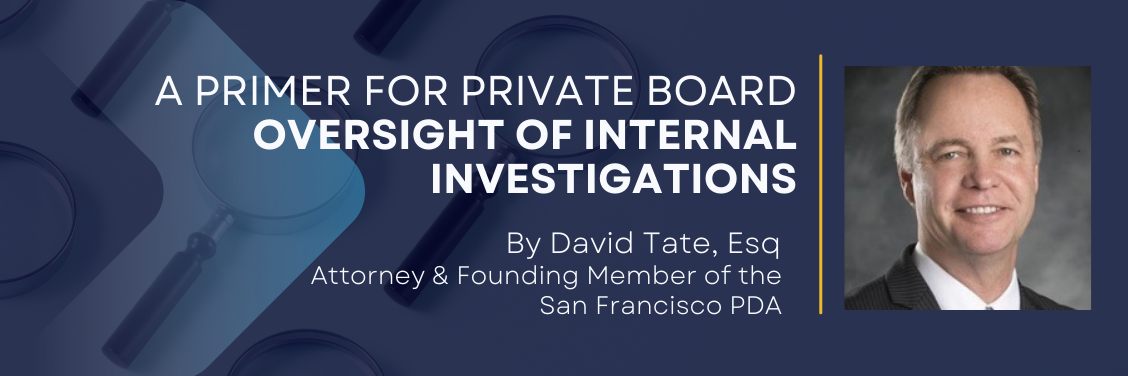A Primer For Private Board Oversight Of Internal Investigations

Internal investigations are a fact of business management and governance. Broadly viewed, there are two general scenarios for private board oversight relating to internal investigations: (1) oversight of management’s investigation processes, and (2) in limited, special circumstances a specific investigation might become a matter for more direct board oversight or involvement.
The board’s oversight of management’s processes will vary from business to business, and industry, and from board to board, The intent, however, is that the board satisfy its oversight that management has in place and practices prudent, effective and sufficient internal investigations. Most internal investigations are handled by management with only perhaps brief reporting to and oversight by the board.
Some examples of internal investigations that are typically handled by management without more active or direct board involvement or oversight include employer, employee and workplace, customer, accident, product safety, theft, and compliance situations. Examples of more limited, special circumstances in which an internal investigation might become a matter for board oversight or involvement more directly include significant or misconduct by senior management, significant financial impropriety, possible criminal liability, significant civil liability exposure, possible board member impropriety, and other scenarios of possible significant business liability exposure, disruption, or impact to reputation.
Internal investigations also necessarily involve discussions about applicable laws, responsibilities and duties including the business judgment rule and any other applicable standards, and possible liability and reputation exposure. Requirements may also be triggered for board committees such as an audit committee or governance committee.
Following an incident one of the initial decisions is whether to conduct an internal investigation. The general leaning should be to conduct an investigation. If the magnitude or potential severity and ramifications of the incident are unknown or not apparent, it may make sense to utilize a progressive or staged investigation process in which the investigation begins at one level of staffing as then prudent under the circumstances, but evolves to a progressively higher level if warranted by the developing circumstances.
Most internal investigations are performed by or under management’s auspices, in which initial questions include, by whom (i.e., an in-house, or an outside investigator), and with or without legal counsel (i.e., in-house counsel, or outside counsel). Using an outside investigator can have advantages. There can also be advantages to using or having the involvement of legal counsel. Those advantages can include, for example, perhaps a higher level of expertise, possible greater independence of investigation, and if by or through legal counsel possible attorney client and work product privileges and protections. Obviously, there also can be additional complications, time, and costs – nevertheless, in appropriate circumstances to do so can be prudent.
The following is a summary of factors that are pertinent to internal investigations and related processes to be considered by management, that might be considered by the board in its oversight and discussions with management, and that will help warrant reliability in the internal investigations.
1. Pre-Investigation Considerations:
- Take the complaint of wrongdoing seriously;
- Maintain confidentiality of the situation to the extent reasonably possible;
- Conduct a timely and prompt investigation; • Decide upon the person or persons or committee to oversee the investigation;
- Decide upon the investigator, and whether in-house or outside;
- Decide upon the involvement of legal counsel, and whether in-house or outside;
- Decide upon any possible specialty services such as CPA or forensic accountant; and
- Consider any issues relating to independence or qualifications, including any appearance of inappropriate conflict or bias
2. Conduct the Investigation:
- Have the investigator conduct a careful, prudent investigation;
- Follow required and any already existing complaint investigation procedures;
- Listen to and treat the different sides fairly and equally;
- Obtain, evaluate and understand the claims that are being made – provide the accuser ample opportunity to offer evidence of his or her claims including what occurred or not, documents that might be relevant, and the names of and information about witnesses who can provide relevant comments about the alleged incident;
- Give the alleged wrongdoer fair notice of the claims being made, and ample opportunity to offer evidence of his or her version and defenses, including what occurred or not, documents that might be relevant, and the names of and information about witnesses who can provide relevant comments about the alleged incident; and
- When appropriate, provide and communicate a way for third parties to provide information that is relevant to the investigation.
3. Post-Investigation Reporting, Deliberations and Actions:
- Have the investigator prepare a well-reasoned report and conclusions based on the evidence;
- Have the investigator report to the decision-maker(s), and board or committee as appropriate (and consider whether oral or written);
- Have the decision-maker(s) evaluate the claims, defenses and investigation; and
- Take action, and implement progressive discipline if appropriate.
While this has been an overview, and each situation is different, the above discussion and processes should hold you in good stead. Thank you for reading this article.

ABOUT DAVID TATE, ESQ.
David Tate, Esq. is a California attorney – his practice primarily involves litigation, disputes and governance pertaining to business, business ownership, workplace, trust, and estate cases, and advising clients on governance, authority, responsibilities and duties, and rights. Mr. Tate also provides mediator services and is an inactive CPA. Mr. Tate is a founding member of the San Francisco PDA Chapter. Mr. Tate has served as the audit committee chair of a $50 million nonprofit, on the boards of two other nonprofits, and on numerous professional CPA and lawyer boards and committees, and also blogs and speaks on related topics. Mr. Tate can be contacted by email at [email protected].
